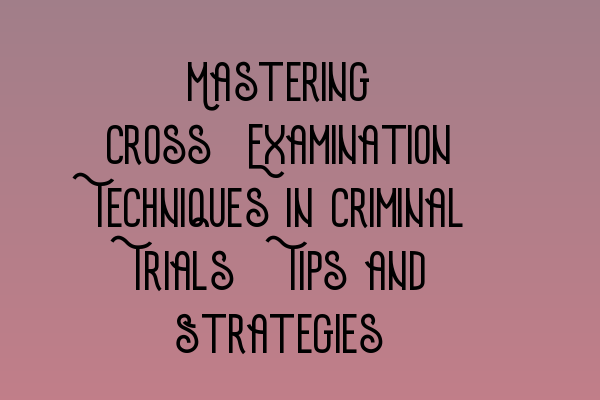Mastering Cross-Examination Techniques in Criminal Trials: Tips and Strategies
Welcome to the SQE Criminal Law & Practice Law UK blog! In today’s post, we will discuss an essential skill for every criminal lawyer: mastering cross-examination techniques in criminal trials. Cross-examination can be a powerful tool in the courtroom, allowing lawyers to challenge the credibility of witnesses and expose weaknesses in the prosecution’s case. By effectively using cross-examination, you can greatly increase the chances of a successful outcome for your clients.
Why Cross-Examination Matters
Cross-examination is a critical part of the adversarial legal system. It allows lawyers to question witnesses who have provided evidence against their clients and challenge their credibility. By subjecting witnesses to rigorous questioning, you can uncover inconsistencies in their testimonies or expose any biases they may have. This can significantly weaken the prosecution’s case and create doubt in the minds of the judge or the jury.
Effective cross-examination can also help you establish alternative explanations or cast doubt on the prosecution’s version of events. By strategically questioning witnesses, you can highlight inconsistencies, elicit favorable admissions, and ultimately strengthen your case.
Tips for Effective Cross-Examination
Mastering cross-examination takes practice, preparation, and skill. Here are some tips and strategies to help you become more effective in the courtroom:
- Prepare thoroughly: Before entering the courtroom, thoroughly review all the evidence, witness statements, and relevant legal precedents. Develop a comprehensive understanding of the case and identify potential weaknesses in the prosecution’s evidence.
- Set clear goals: Determine your objectives for cross-examination. Are you trying to undermine the witness’s credibility, elicit specific information, or establish alternative explanations? Setting clear goals will help you structure your questions and focus your line of inquiry.
- Use leading questions: Leading questions can be a powerful tool in cross-examination. They allow you to control the witness’s answers and elicit the information you want. However, be careful not to ask leading questions that are too suggestive or invite objections from opposing counsel.
- Listen carefully: Pay close attention to the witness’s answers and adapt your questioning accordingly. If the witness provides an unexpected answer, be prepared to adjust your line of inquiry to explore the new information.
For more tips and strategies on mastering cross-examination, check out our related articles:
- Legal Representation for Delaware LLCs in the UK: Expert Advice
- Ensuring Ethical Business Practices: Delaware’s Code of Conduct
- Legal Challenges for UK Businesses in the U.S.: Strategies for Overcoming Hurdles
- Legal Challenges for UK Businesses in the U.S.: Strategies for Overcoming Hurdles
- SQE Exam Prep: Essential Study Materials for Aspiring Solicitors
Conclusion
Mastering cross-examination techniques is essential for every criminal lawyer. By effectively challenging witnesses and exposing weaknesses in the prosecution’s case, you can greatly improve your chances of achieving a favorable outcome for your clients. Remember to prepare thoroughly, set clear goals, and listen carefully during cross-examination. With practice and experience, you can become a formidable advocate in the courtroom.
